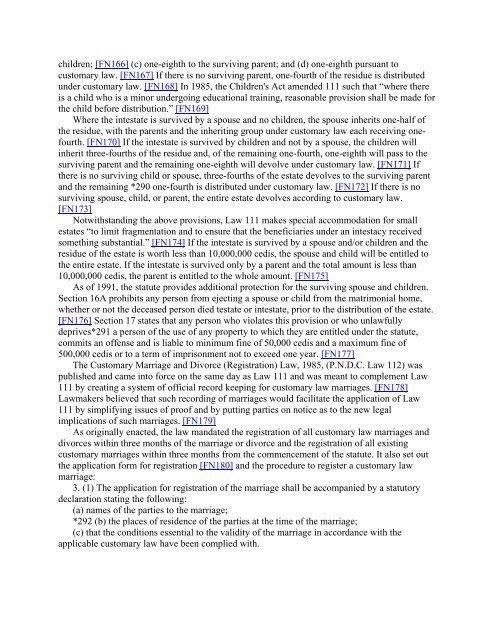Law, Culture and Women's Inheritance Rights in ... - Leitner Center
Law, Culture and Women's Inheritance Rights in ... - Leitner Center
Law, Culture and Women's Inheritance Rights in ... - Leitner Center
Create successful ePaper yourself
Turn your PDF publications into a flip-book with our unique Google optimized e-Paper software.
children; [FN166] (c) one-eighth to the surviv<strong>in</strong>g parent; <strong>and</strong> (d) one-eighth pursuant to<br />
customary law. [FN167] If there is no surviv<strong>in</strong>g parent, one-fourth of the residue is distributed<br />
under customary law. [FN168] In 1985, the Children's Act amended 111 such that “where there<br />
is a child who is a m<strong>in</strong>or undergo<strong>in</strong>g educational tra<strong>in</strong><strong>in</strong>g, reasonable provision shall be made for<br />
the child before distribution.” [FN169]<br />
Where the <strong>in</strong>testate is survived by a spouse <strong>and</strong> no children, the spouse <strong>in</strong>herits one-half of<br />
the residue, with the parents <strong>and</strong> the <strong>in</strong>herit<strong>in</strong>g group under customary law each receiv<strong>in</strong>g onefourth.<br />
[FN170] If the <strong>in</strong>testate is survived by children <strong>and</strong> not by a spouse, the children will<br />
<strong>in</strong>herit three-fourths of the residue <strong>and</strong>, of the rema<strong>in</strong><strong>in</strong>g one-fourth, one-eighth will pass to the<br />
surviv<strong>in</strong>g parent <strong>and</strong> the rema<strong>in</strong><strong>in</strong>g one-eighth will devolve under customary law. [FN171] If<br />
there is no surviv<strong>in</strong>g child or spouse, three-fourths of the estate devolves to the surviv<strong>in</strong>g parent<br />
<strong>and</strong> the rema<strong>in</strong><strong>in</strong>g *290 one-fourth is distributed under customary law. [FN172] If there is no<br />
surviv<strong>in</strong>g spouse, child, or parent, the entire estate devolves accord<strong>in</strong>g to customary law.<br />
[FN173]<br />
Notwithst<strong>and</strong><strong>in</strong>g the above provisions, <strong>Law</strong> 111 makes special accommodation for small<br />
estates “to limit fragmentation <strong>and</strong> to ensure that the beneficiaries under an <strong>in</strong>testacy received<br />
someth<strong>in</strong>g substantial.” [FN174] If the <strong>in</strong>testate is survived by a spouse <strong>and</strong>/or children <strong>and</strong> the<br />
residue of the estate is worth less than 10,000,000 cedis, the spouse <strong>and</strong> child will be entitled to<br />
the entire estate. If the <strong>in</strong>testate is survived only by a parent <strong>and</strong> the total amount is less than<br />
10,000,000 cedis, the parent is entitled to the whole amount. [FN175]<br />
As of 1991, the statute provides additional protection for the surviv<strong>in</strong>g spouse <strong>and</strong> children.<br />
Section 16A prohibits any person from eject<strong>in</strong>g a spouse or child from the matrimonial home,<br />
whether or not the deceased person died testate or <strong>in</strong>testate, prior to the distribution of the estate.<br />
[FN176] Section 17 states that any person who violates this provision or who unlawfully<br />
deprives*291 a person of the use of any property to which they are entitled under the statute,<br />
commits an offense <strong>and</strong> is liable to m<strong>in</strong>imum f<strong>in</strong>e of 50,000 cedis <strong>and</strong> a maximum f<strong>in</strong>e of<br />
500,000 cedis or to a term of imprisonment not to exceed one year. [FN177]<br />
The Customary Marriage <strong>and</strong> Divorce (Registration) <strong>Law</strong>, 1985, (P.N.D.C. <strong>Law</strong> 112) was<br />
published <strong>and</strong> came <strong>in</strong>to force on the same day as <strong>Law</strong> 111 <strong>and</strong> was meant to complement <strong>Law</strong><br />
111 by creat<strong>in</strong>g a system of official record keep<strong>in</strong>g for customary law marriages. [FN178]<br />
<strong>Law</strong>makers believed that such record<strong>in</strong>g of marriages would facilitate the application of <strong>Law</strong><br />
111 by simplify<strong>in</strong>g issues of proof <strong>and</strong> by putt<strong>in</strong>g parties on notice as to the new legal<br />
implications of such marriages. [FN179]<br />
As orig<strong>in</strong>ally enacted, the law m<strong>and</strong>ated the registration of all customary law marriages <strong>and</strong><br />
divorces with<strong>in</strong> three months of the marriage or divorce <strong>and</strong> the registration of all exist<strong>in</strong>g<br />
customary marriages with<strong>in</strong> three months from the commencement of the statute. It also set out<br />
the application form for registration [FN180] <strong>and</strong> the procedure to register a customary law<br />
marriage:<br />
3. (1) The application for registration of the marriage shall be accompanied by a statutory<br />
declaration stat<strong>in</strong>g the follow<strong>in</strong>g:<br />
(a) names of the parties to the marriage;<br />
*292 (b) the places of residence of the parties at the time of the marriage;<br />
(c) that the conditions essential to the validity of the marriage <strong>in</strong> accordance with the<br />
applicable customary law have been complied with.


